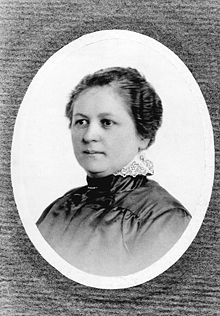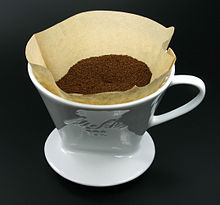This article needs additional citations for verification. (March 2024) |
Amalie Auguste Melitta Bentz (31 January 1873 – 29 June 1950), born Amalie Auguste Melitta Liebscher, was a German entrepreneur who invented the paper coffee filter in 1908. She founded the company Melitta, which still operates under family control.
Melitta Bentz | |
|---|---|
 | |
| Born | Amalie Auguste Melitta Liebscher 31 January 1873 |
| Died | 29 June 1950 (aged 77) |
| Occupation | Entrepreneur |
| Spouse | Hugo Bentz |
| Children | 3 |

The Melitta filters, made with specialized paper, transformed coffee brewing by simplifying it, the innovation also addressed issues of wastage and cleanliness.
Early life edit
Melitta Bentz was born in Dresden, Germany, on January 31, 1873. She was born by the name Amalie Auguste Melitta Liebscher, and her parents were Karl and Brigitte Liebscher. She was born into a family of successful businessmen and entrepreneurs, her father, was a publisher while her grandparents founded and owned a brewery. She married Johannes Emil Hugo Bentz, who was a small business owner in either 1898 or 1899, and the couple had three children, including two sons: Willy in 1899 and Horst in 1904; and one daughter by the name of Herta in 1911.
Melitta began her day with a cup of coffee, which left a bitter taste on her lips. Or with ground in her mouth. Porcelain percolators and fabric filters were the standard brewing methods at the time. These produced over-brewed coffee, which frequently had grounds floating in the cup. This was a shared experience that most of the world accepted, but not Melitta. Determined to find a solution to this common problem, Bentz embarked on a mission to develop a better way to filter coffee grounds, drawing inspiration from her everyday household items.[1]
Invention and early corporate growth edit
In 1908, Bentz's experimentation led her to create a simple yet effective solution: she punched holes into the bottom of a brass pot and lined it with a piece of blotting paper from her son's school notebook. She then poured hot water over ground coffee beans, and the resulting brew passed through the paper, leaving behind a smooth and sediment-free cup of coffee.[2] She shared her discovery with her friends. Encouraged by their enthusiasm and aware of the enormous potential of her idea, she decided to bring it to market and applied for a patent. After recognizing the potential of her invention, Bentz and her husband, Hugo, founded the company "Melitta" to manufacture and sell her innovative coffee filters. On June 20, 1908, the Imperial Patent Office granted her utility model protection for a round filter with prefabricated filter paper. The patent was officially published in the "Patentblatt" (patent bulletin) in July of 1908.[3]
Melitta Bentz's entrepreneurial journey began in the most humble of settings, a single room in her family's apartment. With a starting capital of just 72 pfennigs, Bentz with her husband and sons as the company's first employees. Despite its modest beginnings, Bentz's innovative coffee filter quickly gained popularity. Within a few years, the company's products were awarded a prestigious gold medal at the International Hygiene Exhibition in Dresden, indicating the growing popularity of Bentz's invention. As the business grew, the family's flat became too small to accommodate the expanding operations, prompting the company to relocate to new headquarters in Dresden and hire employees outside of the immediate family circle.
The challenges of World War I, however, put Bentz's resilience to the test. With paper becoming a scarce commodity and the import of coffee beans banned by the German government, the production of filters had to be put on hold. Undaunted, Bentz pivoted her business, deciding to start producing cardboard boxes in order to keep the company afloat. During this time, Bentz ran the entire business by herself, as her husband had been called to military duty.When the war came to an end, Bentz wasted no time in resuming the production of her signature coffee filters. The company's expansion accelerated, and in 1925, Melitta launched its iconic red and green packaging, making the brand instantly recognizable and helping to protect it from numerous imitators.[4]
Melitta's growth and success continued, and in the 1930s, Bentz's two sons took over ownership of the company. Under their leadership, the Melitta brand cemented its position as a global leader in the coffee and tea industries, providing a diverse range of products that are still enjoyed by millions of coffee and tea enthusiasts worldwide.
Struggles during World War I edit
As World War I broke out across Europe, Melitta’s business encountered several problems. For starters, Melitta’s husband and her elder son, Willy, were drafted into the German Army. Melitta’s brother, Paul Liebscher, was able to help keep the company afloat during the war.[1] Getting materials for the business became difficult during the war. Metals were being used for Zeppelin construction and paper was rationed, which were key materials used to make and be able to use her coffee filters. Furthermore, the British blockade of Germany made it extremely difficult for coffee beans to be imported into Germany, and demand for her product began to fall.[2]
Post-war period and expansion of company edit
After World War I ended, the business was able to resume normal operations. However, post-war Germany faced widespread poverty and rampant inflation. Despite these economic setbacks, the company was able to thrive once again. In 1923, her eldest son Willy became the co-owner and increased sales significantly.[3] During the early 1920s, there were several imitators of Melitta’s coffee filter design. In 1925, in order to combat these imitators, the company created the red and green packaging that is still used to this day to separate itself from imitators.[4]
The company was experiencing tremendous success and needed to expand its production capacity. In 1929, the company moved from its Dresden factory into Minden where the plant is still in use to this day. In the 1930s, the company patented the paper filters that are also still used to this day.[1] To further protect the business from imitators, in 1932 the first Melitta lettering was introduced as another identifying feature to consumers. The lettering was changed slightly in 1937 but remained the same onwards.[4] Melitta and her husband stepped down from daily operations in 1932 and passed control over to their children. Melitta would still play a role in the business when it came to providing better working conditions for their staff. She established a five-day work week, three weeks of vacation time, and a Christmas bonus. She also founded Melitta Aid in 1938 as a social fund for employees.[1]
Addressing a Pain Point & Impact on Society edit
Bentz's invention addressed a significant pain point for coffee drinkers of her time: the inconvenience and inconsistency of traditional brewing methods. Before the introduction of the coffee filter, brewing coffee often involved tedious and messy processes that yielded unpredictable results. Bentz's filter provided a simple and efficient solution, allowing users to enjoy a consistently smooth and flavorful cup of coffee without the hassle of dealing with coffee grounds.
Furthermore, the introduction of Bentz's coffee filter had a significant impact on society, changing how people brewed and consumed coffee. Her invention enabled people to enjoy high-quality coffee in the comfort of their own homes, resulting in increased coffee consumption and the establishment of a coffee culture around the world. The convenience and dependability of Bentz's filter also paved the way for the widespread use of automatic drip coffee makers, which simplified the brewing process for millions of coffee enthusiasts.
Legacy and impact edit
Melitta Bentz passed away at the age of 77 on June 29, 1950. Her legacy still lives on to this day. Melitta was one of the first women in Germany to have her own personal invention protected by a patent.[1] Today, Melitta Bentz's invention is still in use and has evolved with advancements in coffee brewing technology. Her company, still a family-run business, has grown into a global enterprise, offering a range of coffee-related products. The family business now produces 50 million coffee filters every day, because despite tabs and capsules, the classic filter coffee continues to enjoy great popularity. [3]
Melitta Bentz's legacy extends beyond this invention. Her commitment to improving not only the coffee brewing process but also the working conditions of her employees was remarkable. She introduced benefits such as Christmas bonuses and paid vacations, and established "Melitta Aid" for employees in financial distress. This holistic approach to business, focusing on both product innovation and employee welfare, was ahead of its time and set a precedent for future entrepreneurs.
See also edit
References edit
- ^ a b c d Cite error: The named reference
:2was invoked but never defined (see the help page). - ^ Coffee and WWI. National WWI Museum and Memorial. (n.d.). https://www.theworldwar.org/learn/about-wwi/coffee-and-wwi
- ^ a b Cite error: The named reference
:0was invoked but never defined (see the help page). - ^ a b Cite error: The named reference
:1was invoked but never defined (see the help page).
- "Overlooked No More: Melitta Bentz, Who Invented the Coffee Filter." The New York Times, 5 Sept. 2018, www.nytimes.com/2018/09/05/obituaries/melitta-bentz-overlooked.html.
- Reed, Lawrence W. "How a German Housewife Fed up with Grounds in Her Coffee Revolutionized the Famous Drink." Foundation for Economic Education, 9 Apr. 2020, fee.org/articles/how-a-german-housewife-fed-up-with-grounds-in-her-coffee-revolutionized-the-famous-drink.
- Gourdeau, CC. "Melitta Bentz Changed the Way We Brew Coffee Forever." Tasting Table, 3 Dec. 2022, [www.tastingtable.com/1117773/melitta-bentz-changed-the-way-we-brew-coffee-forever](http://www.tastingtable.com/
Further reading edit
- Hempe, Mechthild (2008). Written at Minden, Germany. Melitta Unternehmensgruppe (ed.). 100 Jahre Melitta - Geschichte eines Markenunternehmens [100 years Melitta - History of a brand company] (in German) (1 ed.). Cologne, Germany: Geschichtsbüro Verlag / Geschichtsbüro Reder, Roeseling & Prüfer GbR. ISBN 978-3-940371-12-6. (2+140+2 pages) (NB. There is also a French translation named 100 années Melitta - L'histoire d'une marque. Reportedly, English and Brazilian translations exist as well.)
- Schwenke, Philipp (2021-09-04). "Wie Melitta Bentz den Kaffeefilter erfand und damit einen Weltkonzern schuf - Melitta Bentz – Erfinderin, Gründerin, Phantom". Wirtschaft & Politik > History & Crime. Capital. Pionierinnen der Wirtschaft (in German). Vol. 2021, no. 9. Retrieved 2024-01-27.
- "The invention of the coffee filters - Melitta Bentz, mother of filter coffee: Inventor and entrepreneur". German Patent and Trade Mark Office (DPMA). 2023-01-27. Archived from the original on 2023-01-29. Retrieved 2023-01-29.